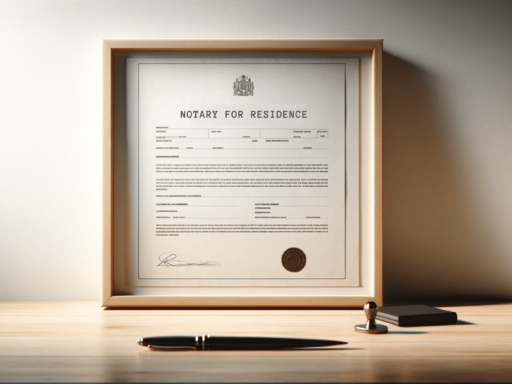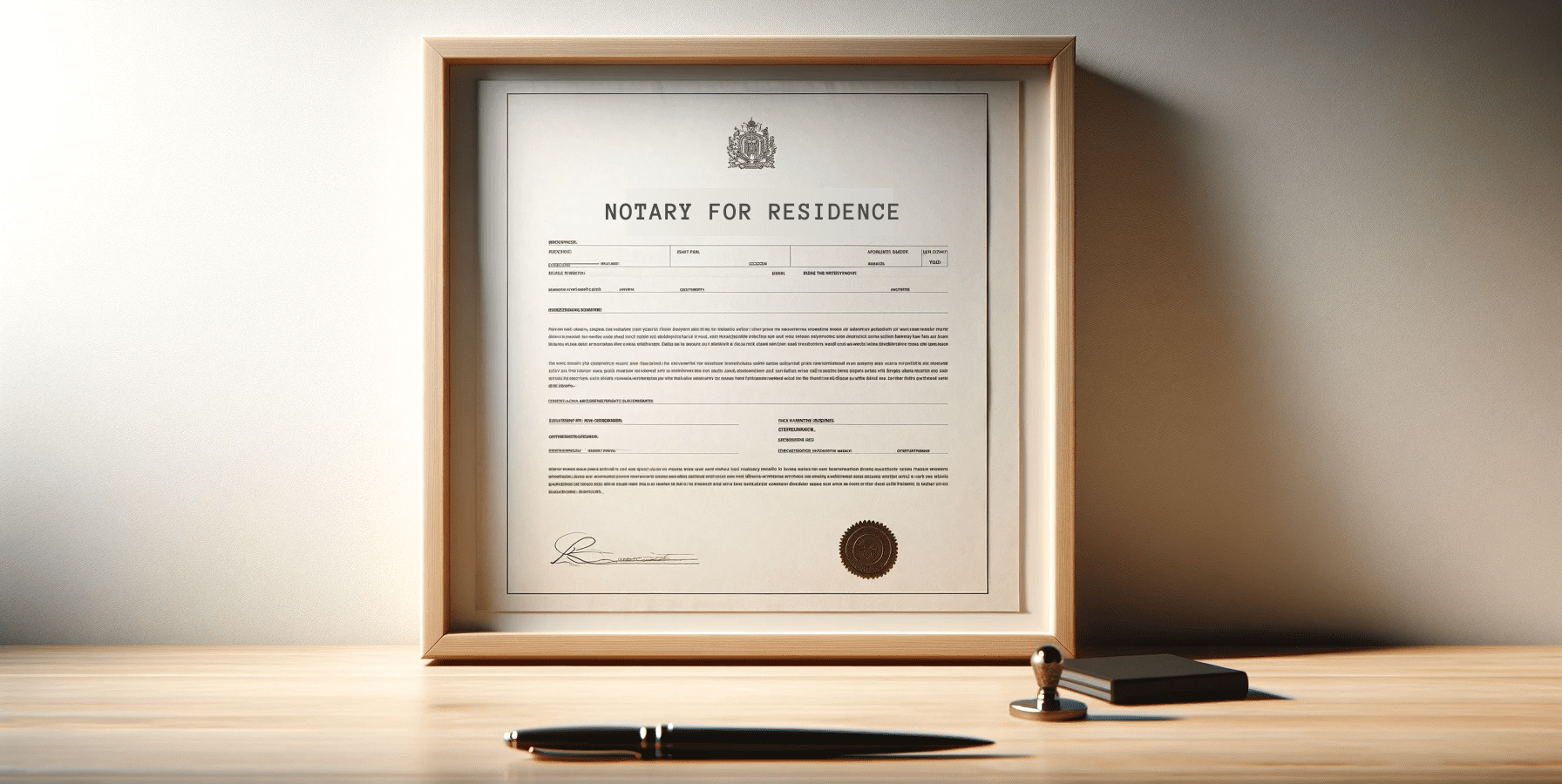If you’re ever in a position where you need to confirm where you live for a variety of different reasons, such as school enrollment, getting a driver’s license, or even to put in a loan application, an Affidavit of Residence may turn out to be a handy tool for you. Nonetheless, don’t worry, this article has every essential thing you need to know in order to be able to understand and properly use an Affidavit of Residence template.
Understanding the Affidavit of Residence
An Affidavit of Residence is a formal declaration that a person makes regarding their residence through a legal document. It is proof that a particular person lives in a certain locality. It is a very important paper as it validates one’s presence in a place that may have very legal and official consequences.
Let us further explore the purposes and uses of an Affidavit of Residence.
Examining an Affidavit of Residence: Uses and Purpose
An Affidavit of Residence serves various purposes and finds relevance in many situations. Here are a few key areas where this document can come in handy:
Enrolling in a School: In the event of your child’s enrollment in a new educational institution, the system in the assigned district may require you to substantiate your residency by presenting documents indicating your current residence in that district. Completing an Affidavit of Residence is the quickest route to establishing your residency. Getting your child a new school and the whole process itself is one of the things that can give you so much joy ,and yet you will feel very anxious. However, due to serious reasons, a school must have a specific number of children within a particular area.
Further, they have the right to check if the child has a district where he lives. Thus, they may need to plan. Furthermore, the security of children’s lives is part of the process, and hence, the children’s parents must be the ones to guarantee their identity. This step makes the registration process easier and quicker than any other means. The situation where you need the document is now, and now you have it, you only have to deliver it so that you can use it to get your child registered.
Changing a Driver’s License: In the case of the application for a driver’s license from a place different from the one you live in, with the help of an Affidavit of Residence, you may be required to provide proof of your place of residence. Filling out an Affidavit of Residence form is also one of the ways to show the driver’s license office that you live within their jurisdiction. Migration to a new state or country will definitely be an exciting time for you, though not without the archaic to-dos, one of which is to get a local driver’s license. In addition, you are most likely going to meet the obligation to provide your identity documentation tied to your new address.
Requesting a Loan: One of the things that banks sometimes require their clients to submit to prove their permanent residence is an affidavit, besides numerous other documents that are part of the loan application. The notarized letter, in this case, will replace the borrower’s statement as to his or her present place of living, hence strengthening the loan application.
When securing a loan, the loan could be for the property, car, or other uses, and the creditors often inquire to provide evidence of the borrower’s residence. The major significance of this move is to confirm whether the borrower is really living in the place he/she has indicated and thus remains the financial family breadwinner. An Affidavit of Residence, when it is subscribed and signed in a manner that demonstrates compliance with all legal requirements, is the surest way to lay before the lender the fact of the borrower’s abode. By this type of document being put in the system, the success of the loan application comes in and the borrowers’ chances of the loan being authorized rise drastically.
Crafting a Clear and Effective Affidavit of Residence
Now that you understand the importance of an Affidavit of Residence, let’s explore how to create one that is clear, effective, and meets all requirements.
Step-by-Step Guide to Writing an Affidavit of Residence
Writing an Affidavit of Residence may seem daunting, but fear not! Follow these step-by-step guidelines to craft a compelling document:
- Start with the Heading: To be very specific, you can use the heading to start the document as an Affidavit of Residence, and then introduce yourself with your full name, address, and the date of the document.
- Introduction and Purpose: You may want to provide a brief introduction that gives meaning to the purpose of the affidavit.
- Statement of Residency: Advanced writers seek to provide not only the residential address but also the necessary and additional material related to it, in the most succinct and detailed way.
- Sworn Declaration: Significant and explicit is an aspect that can be mentioned, which is a declaration of the truthfulness of the information in the affidavit and the conviction of the speaker to the best of his or her ability that it is indeed so.
- Signature and Notarization: Bear your signature on the document and let the notary public be a witness that you signed in their presence and they can also tell whether your signature is true or a fake easily.
Key Elements to Include in Your Affidavit of Residence
In order to make your Affidavit of Residence a piece of quality work, which will be efficient and convincing, you will need to make sure that it contains the following vital parts:
- Your Full Name: that is, provide your full name as it is indicated on the official documents.
- Your Address: If your residence has any apartment numbers or unit designations, do not forget to mention them in the request.
- Date: State the exact date that the affidavit was made.
- Notary Public: Reserve a spot for the levying of the notary public’s official seal and signature on the document because these are the formal symbols of the notary’s action and attestation.
Ensuring Accuracy: Understanding the Terms in an Affidavit of Residence
When drafting an Affidavit of Residence, it is crucial to ensure accuracy and clarity in the terms used. Some common terms you may encounter include:
- Affiant: This refers to the person who is providing the sworn statement in the affidavit.
- Notary Public: This is a certified public official with the authority to witness and authenticate legal documents.
- Jurisdiction: This refers to the governing authority, such as a city, county, or state, in which the Affidavit of Residence is being executed.
Common Questions About Affidavits of Residence
Now that we’ve covered the basics, let’s explore some common questions that often arise when it comes to Affidavits of Residence.
Who Should Use an Affidavit of Residence?
An Affidavit of Residence can be used by individuals who need to provide proof of their residence for various purposes, such as obtaining government services, enrolling in educational institutions, or applying for certain licenses or permits.
Tips for Writing an Effective Affidavit of Residence
Writing an effective Affidavit of Residence can be a breeze with these helpful tips:
- Make Your Point Quickly and Easily: The first thing you need to provide is your location and the reason why you need this affidavit.
- Be Specific: For instance, in your residence, you can talk about the property’s kind, the number of the members who live in, or the time you have lived in the place.
- Thoroughly Re-read and Correct: Before putting your signature to the paper, make sure that the information is error-free and there is no contradiction.
How to Get Your Affidavit of Residence Notarized
To make your Affidavit of Residence legally valid, you will need to get it notarized. Here’s how the process typically works:
- Locate a Notary Public: Choose a notary public who has the ability to perform the services in your jurisdiction.
- Remember to Take Your ID: If you go to the notary public, make sure you take one of your official identifications with you to prove you are the one who is mentioned in the document.
- Sign in Front of Them: To endorse the statement of residence, you should write your name and put your signature on the document after the notary public.
Essential Checklist for Completing an Affidavit of Residence
To ensure accuracy and completeness when completing your Affidavit of Residence, consider following our Make it Legal™ Checklist:
- Make sure your address and other personal details are correct with a second check.
- Scan your affidavit for errors of information and sections left incomplete.
- Prepare a photo of the affidavit you have signed and notarized to keep a copy for your files.
Related Documents for Residency Matters
In addition to the Affidavit of Residence, several other legal documents may come in handy when dealing with residency matters. Here are a few worth considering:
Other Legal Documents to Consider for Residency Verification
Depending on your specific situation, the following documents can serve as additional evidence of your residency:
- Utility Bills: Submit utility bills issued in your name to support the length of your stay in one place.
- Lease Agreement: A lease agreement showing your presence in a particular area will be enough in case you rent a property.
- Government Correspondence: You might utilize any official government letter or any other correspondence received at your address to establish the truth.
Exploring the Uses of Affidavits in Different Situations
Affidavits are versatile legal documents and can be used in various situations beyond residency matters. Here are a few common scenarios:
Affidavit of Support: This document is submitted to certify that the sponsor is financially capable of assisting the immigrant or visa applicant.
Affidavit of Identity: This document is used in many cases to prove a person’s identity, for example, when opening a bank account or performing legal procedures.
Affidavit of Loss: This document is done to make authorities aware of the loss of certain identified documents, which are mainly the person’s cards, passports, and driver’s licenses.
Important Documents for Rental Applications and Agreements
When it comes to renting property, several documents play a crucial role. Some important documents to consider include:
- Rental Application: This form helps landlords screen potential tenants by gathering essential information.
- Lease Agreement: This legally binding document outlines the terms and conditions of the rental agreement between the tenant and landlord.
- Security Deposit Receipt: This document provides proof of the tenant’s payment of a security deposit before moving into the property.
Online Notarization with BlueNotary for an Affidavit of Residence
Given the trend towards digitalization, signing and verifying documents electronically with a notary pen online has not only become fashionable but also convenient. By using BlueNotary, you can forget about the inconvenience in arranging a meeting with a notary. You solve most of your issues if you have access to the internet and a webcam, and the Affidavit of Residence is notarized right from your bed.
BlueNotary employs the most up-to-the-minute technology to create a highly secure and legitimate system for online notarizations. The platform is very simple, and you are guided through each step, so it will be a joyful experience.
Summing up, an Affidavit of Residence is a very important document that can be used to demonstrate and confirm your residency for different purposes. It is possible to write, to get an effective affidavit of residence, and to perform the notarization following the essential steps that you will know how best to deal with residence-related issues. Always have the checklist within your reach, and in addition, you may want to check the range of related documents available to further support your residency claims. If you want to come up with a very attractive online notarization idea that is also really time-saving and secure, why not give BlueNotary a try? You are your own guide to becoming a residency expert if you can achieve success with this full guide!








